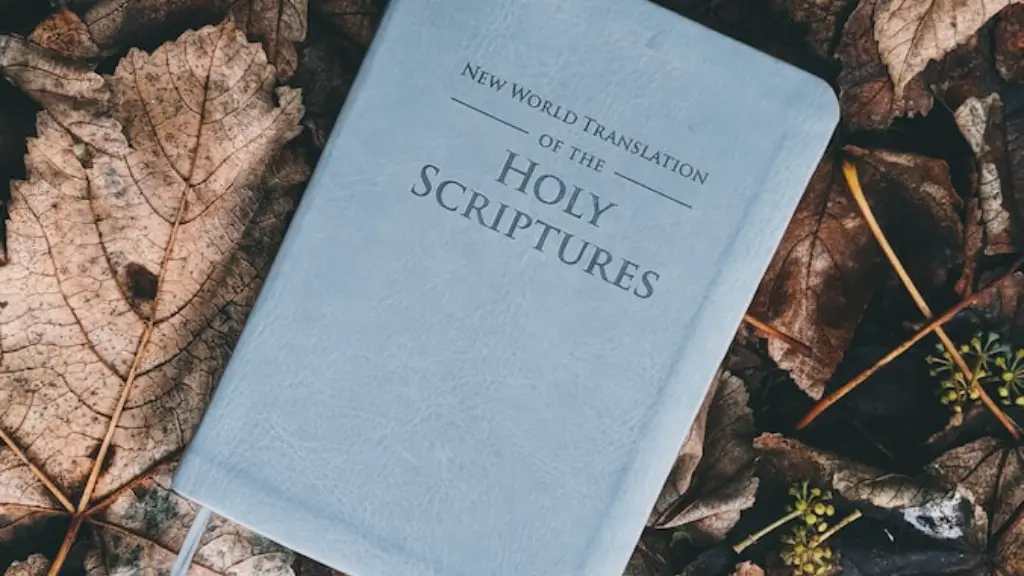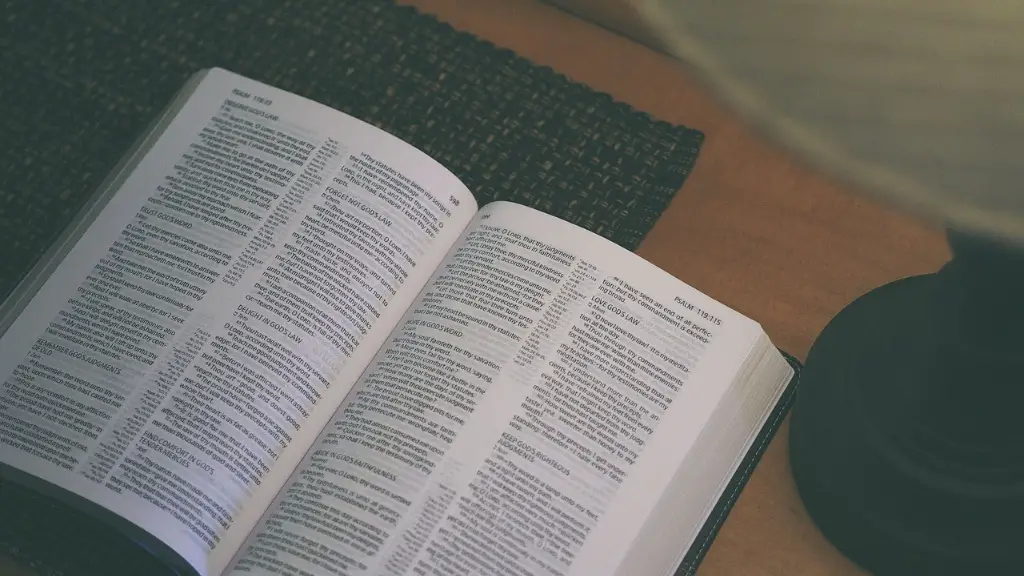What Does The Bible Say About Forgiving Yourself?
Forgiveness is one of the main tenets of the Christian faith and is something that is considered important in many other major world religions. It is seen as a necessity for healthy relationships between individuals and between communities. However, while the Bible is clear on the importance of forgiving others in the form of forgiving trespasses, the Bible is less clear on what it says about forgiving oneself. Here, we take a look at what some theologians say about self-forgiveness and how believers should approach this moral issue.
The importance of forgiving oneself is not explicitly stated in the Bible, nor is it part of traditional Christian teaching. However, there are several passages in the Bible that suggest self-forgiveness is important. For instance, Matthew 6:14-15 states “For if you forgive other people when they sin against you, your heavenly Father will also forgive you. But if you do not forgive others their sins, your Father will not forgive your sins”. However, the context of this verse is in regards to forgiving others and not necessarily self-forgiveness.
Many Christian scholars have argued that self-forgiveness is an important element of being a faithful Christian as it is necessary to accept God’s forgiveness of yourself. In its simplest form, self-forgiveness is about restoring the relationship we have with ourselves, after we have made a mistake. It also allows us to move on from any guilt or shame we are feeling as a result of an instance of sin.
To understand forgiveness more fully, some theologians suggest looking at certain Bible stories. For example, the story of the Prodigal Son, found in Luke 15:11-32, is seen by some as providing a useful insight into the concept of self-forgiveness. In this parable, the son sets off on a journey to return to his father and recognise the wrongdoing he has caused. This journey of self-discovery and self-forgiveness culminates in the father showing unconditional love and acceptance.
Another example of self-forgiveness in the Bible is found in the story of David in 2 Samuel 11-12. After it is discovered that David had acted immorally with a woman named Bathsheba, David reflects deeply on what he has done and repents of his actions. In closing this chapter, the Bible says that “David’s guilt was removed”. This implies that David had gone through a process of self-forgiveness and even beyond that, was able to forgive himself.
Ultimately, we can see that self-forgiveness is a complex moral issue, but one that is necessary for believers to undertake in order to reconcile with God. In learning and carrying out the importance of self-forgiveness, we can show and accept love and compassion for ourselves and work towards being better people in the eyes of both ourselves and God.
Biblical Examples of Self-Forgiveness in Practice
One of the most well-known examples of self-forgiveness in the Bible is found in the story of the temptation in the wilderness, which is found in the book of Luke (4:1-13). In this narrative, Jesus is taken out into the desert by the devil and challenged to prove his faithfulness. After successfully resisting all temptations, Jesus is able to show self-forgiveness for any moments of doubt or weakness he may have had.
The story of Peter denying Jesus is another Biblical example of how a believer may confront their own misdeeds with self-forgiveness. After denying knowing Jesus three times, Peter is left feeling guilty and ashamed. However, after Jesus approaches Peter and speaks with him, it is clear that he has been granted forgiveness. Here, we can see that believing in the power of self-forgiveness allows for the restoring of relationships and a space for growth and development.
The parable of the lost sheep, found in Matthew 18:11-14, is one of the best-known illustrations of how God shows forgiveness to repentant sinners. It is here that Jesus describes the joy of a shepherd who goes out of his way to search and find the lost sheep after it wandered away, before forgiving it and celebrating its return. This parable succinctly describes the idea of self-forgiveness and how it is connected to divine, unconditional love.
Spiritual Implications of Forgiving Yourself
The ability to forgive oneself and accept love is one of the greatest gifts of Christianity, with the practice of self-forgiveness opening up a pathway towards a fuller relationship with God. It reminds us that we are all fallible and, by allowing ourselves to make mistakes and accept love as part of the process of self-forgiveness, it helps us become greater disciples of Jesus Christ.
Forgiveness is seen as a sign of commitment to the divine order of life and while we may sometimes struggle to forgive ourselves, the Bible demonstrates that this is not too much to ask. When practiced correctly, self-forgiveness can be a powerful tool for spiritual growth and creating a deeper connection with God.
The power of self-forgiveness lies in its ability to provide an opportunity for healing and restoration. The ability to forgive ourselves helps us move past the guilt we may be feeling, and to focus on the positive things in our lives such as the love from God. We can learn from our mistakes and grow from them, and self-forgiveness is an essential part of that journey.
The Benefits of Self-Forgiveness
The practice of self-forgiveness doesn’t always come easy, but the benefits of self-forgiveness are many. Firstly, it can promote a healthier overall view of ourselves, which can lead to improved mental and physical health. Secondly, it can promote better relationships with others, by allowing us to extend the same mercy to others that we gave to ourselves. Thirdly, it can help us to grow and become better followers of Jesus Christ, as understanding our own wrongdoings can help us understand the mercy and grace of God.
The Bible doesn’t explicitly talk about self-forgiveness, but there are many stories and verses that suggest it is an important part of what it means to be a faithful Christian. By remembering the importance of self-forgiveness and being willing to confront our misdeeds and mistakes, we can learn to accept love and live better lives in the eyes of God.
The Role of the Church
The Church has an important role to play in reminding believers of the importance of self-forgiveness. It is the Church’s role to remind us that no matter how great our wrongdoings are, forgiveness is possible and that, in response to showing mercy to ourselves, we will be granted mercy from God. By acknowledging our wrongdoings and forgiving ourselves, we can become a stronger and more faithful community, capable of loving and showing mercy to those around us.
In the past, religious institutions have caused significant damage through their teachings of exclusion and hate. In order for the Church to move forward, the teachings of self-forgiveness and the ability to accept love is essential. By looking to Jesus’ teachings of mercy and compassion, the Church can help foster an atmosphere of self-forgiveness, acceptance and love.
Going Beyond Forgiveness
Finally, it is important to recognise that forgiveness isn’t the end of the journey. After committing wrongs, forgiving and healing needs to take place. However, it is also important to note that forgiveness alone is not the be-all-end-all solution. Other steps need to be taken towards making amends and restoring trust. This could include taking responsibility for our actions, respecting another person’s feelings, or reconciling with them if the relationship has been damaged.
Forgiveness is part of the healing process and it is essential to remember that it is not only a way of letting go but also a way of learning from our past, in order to become better in the eyes of God. After forgiving ourselves, we can then turn to situations or relationships where forgiveness may be needed, and create an attitude of love and compassion.
Reconciling Justice with Forgiveness
One of the most difficult aspects of granting self-forgiveness is reconciling accountability with self-forgiveness. On the one hand, we are encouraged to take responsibility for our wrongdoings and seek justice through identifying and addressing the consequences of our actions. On the other, we’re also encouraged to forgive and have mercy on ourselves. The question arises, how can justice and self-forgiveness go hand-in-hand?
Justice is an important part of the Christian faith and it is right that we should seek to create justice in our lives. However, justice does not mean condemnation but rather, an understanding that our actions have consequences and an acceptance of those consequences. In this sense, justice and self-forgiveness can coexist, with self-forgiveness providing a way of reconciling with ourselves and with God, as part of a journey towards a more just world.
The Importance of Patience and Openness
It is also important to note that self-forgiveness requires patience and openness. The process of coming to accept love in spaces of pain and hurt can be difficult and it is important to remember that it is ok to not feel fully healed straight away. The Bible teaches us that there is strength in sensitivity and that it is ok to show and feel compassion towards ourselves. It is a reminder that each person takes different lengths of time on the journey towards self-forgiveness and that, ultimately, the acceptance of love is what matters most.
The process of self-forgiveness is a learnt skill and, while it is not something that can be mastered overnight, it is something that can be learnt and practiced daily. By remembering the message of divine mercy that comes to us from the Bible, and remembering the stories of self-forgiveness from its pages, we can take steps towards greater spiritual growth and understanding of God’s love for us.





